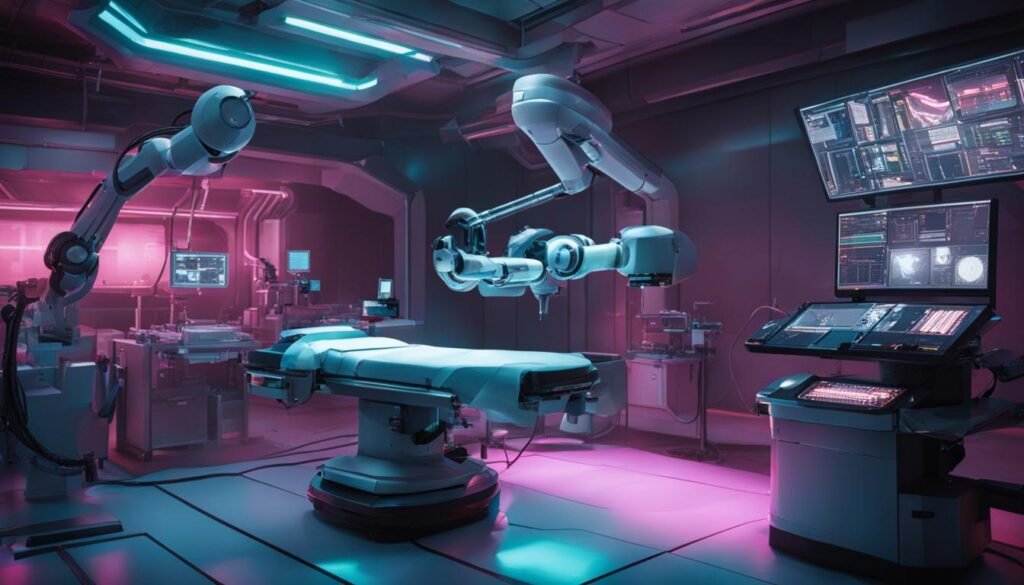
Shaping the Future: Artificial Intelligence in Healthcare

We are witnessing a transformative era in healthcare with the emergence of artificial intelligence (AI) technologies. The potential of AI to revolutionize patient care, diagnostics, and decision-making is immense. With AI at the helm, healthcare providers can leverage machine learning and deep learning to analyze vast amounts of healthcare data, leading to more accurate diagnoses and personalized treatment plans.
By harnessing AI, healthcare professionals can access real-time insights and predictive analytics, empowering them to make informed decisions that can truly make a difference. Imagine a future where AI-enabled technologies assist in early disease detection, analyze medical images with unparalleled precision, and remotely monitor patients' vital signs for timely interventions.
See Also... Exploring Artificial Intelligence in Education: A Modern Approach
Exploring Artificial Intelligence in Education: A Modern ApproachAI's impact does not stop there. In the realm of healthcare decision support systems, AI can sift through vast amounts of patient data, medical literature, and clinical guidelines to provide evidence-based recommendations. Such systems can streamline clinical workflows, automate routine tasks, and ultimately improve patient outcomes.
Key Takeaways:
- AI technologies have the potential to revolutionize healthcare, enhancing patient care and transforming decision-making processes.
- Machine learning and deep learning enable AI to analyze extensive healthcare data, leading to more accurate diagnoses and personalized treatment plans.
- AI can aid in early disease detection, enhance medical imaging analysis, and enable remote patient monitoring systems.
- Healthcare decision support systems powered by AI provide evidence-based recommendations, streamline workflows, and reduce errors.
- The future of healthcare is promising with the integration of AI, unlocking enhanced efficiency and improved patient outcomes.
The Role of AI in Patient Care
Artificial Intelligence (AI) has emerged as a game-changer in the field of healthcare, offering immense potential to improve patient care. AI technologies are revolutionizing healthcare by leveraging machine learning and deep learning algorithms to analyze vast amounts of data and provide valuable insights. With its ability to analyze medical images, AI plays a crucial role in early detection and prevention of diseases, enabling healthcare providers to identify abnormalities that may be missed by human radiologists. This has a significant impact on patient outcomes, as timely detection can lead to better treatment options and improved prognosis.
A key area where AI shines in patient care is remote monitoring systems. By continuously tracking vital signs and using AI algorithms, healthcare professionals can detect any changes that might require immediate attention. This ensures early intervention, reducing the risk of complications and improving patient safety.
Medication management is another aspect where AI is making a difference. By leveraging AI technologies, healthcare providers can ensure that patients take the correct medications at the right time. AI-powered systems can monitor medication adherence, provide reminders, and flag potential drug interactions, ultimately improving patient compliance and reducing medication errors.
See Also... Unlocking Potential: Artificial Intelligence in Finance
Unlocking Potential: Artificial Intelligence in FinanceOverall, AI has the potential to revolutionize patient care by enhancing early detection, enabling remote monitoring, and improving medication management. With its ability to analyze large amounts of data and provide real-time insights, AI is poised to transform the healthcare landscape, leading to improved patient outcomes and a more efficient healthcare system.

Table: Benefits of AI in Patient Care
| Benefit | Description |
|---|---|
| Early Detection and Prevention | AI can analyze medical images and detect abnormalities, enabling early intervention and better treatment outcomes. |
| Remote Monitoring | AI-powered systems can track patient vital signs remotely, allowing for timely detection of changes that may require immediate attention. |
| Medication Management | AI technologies can ensure patients take the correct medications at the right time, improving adherence and reducing medication errors. |
AI in Healthcare Decision Support Systems
In today's rapidly evolving healthcare landscape, AI is revolutionizing decision support systems. We, as healthcare professionals, are witnessing the transformative impact of AI in improving patient care and outcomes.
Healthcare decision support systems empowered by AI technologies harness the power of data analysis to deliver evidence-based recommendations. By analyzing vast amounts of patient data, medical literature, and clinical guidelines, these systems help us make more accurate diagnoses and choose the most suitable treatments.
See Also... Unlocking Potential: Artificial Intelligence in Marketing
Unlocking Potential: Artificial Intelligence in MarketingBut AI's role doesn't stop there. By automating routine tasks like documentation and scheduling, decision support systems streamline our clinical workflows, saving precious time and reducing errors. This allows us to focus more on direct patient care, providing better experiences and outcomes for those we serve.
Embracing AI in healthcare decision support systems not only enhances our efficiency but also reduces the risk of medical errors. By leveraging the power of AI, we can make informed decisions, predict patient outcomes, and significantly improve the overall quality of care we deliver.
FAQ
How can AI improve patient care in healthcare?
AI can enhance patient care by aiding in early detection and prevention of diseases, analyzing medical images for abnormalities, assisting in remote monitoring of vital signs, and ensuring proper medication management.
See Also... Explore Artificial Intelligence in Gaming: Next-Level Play
Explore Artificial Intelligence in Gaming: Next-Level PlayWhat role does AI play in healthcare decision support systems?
AI powers healthcare decision support systems by analyzing patient data, medical literature, and clinical guidelines to provide evidence-based recommendations. It helps healthcare providers make accurate diagnoses, select appropriate treatments, and predict patient outcomes.
How does AI enhance efficiency in healthcare?
AI automates routine tasks, such as documentation and scheduling, in clinical workflows, reducing errors and improving efficiency. It also enables real-time insights and predictions, supporting clinical decision-making and ultimately enhancing patient care.
Source Links
- https://napavalleyregister.com/news/local/napa-chatgpt-ai-artificial-intellegence-mars-education-teaching-cheating-technology-classroom/article_ed97176e-87ff-11ee-b931-d30cbc1a9819.html
- https://www.royalgazette.com/local-business/business/article/20231122/sir-john-calls-for-a-reshaping-of-the-economy/
- https://washingtoncitypaper.com/article/639122/capital-play-online-gamblings-surprising-role-in-shaping-dcs-entertainment-future/
 Embracing Artificial Intelligence in Smart Homes: A Modern Living Guide
Embracing Artificial Intelligence in Smart Homes: A Modern Living GuideIf you want to know other articles similar to Shaping the Future: Artificial Intelligence in Healthcare you can visit the Blog category.
Leave a Reply






Related Post...